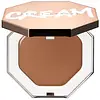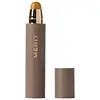Fenty Beauty Cheeks Out Freestyle Cream Bronzer Versus Merit Beauty The Minimalist Perfecting Complexion Foundation and Concealer Stick
What's inside
What's inside
 Key Ingredients
Key Ingredients

 Benefits
Benefits

 Concerns
Concerns

 Ingredients Side-by-side
Ingredients Side-by-side

Octyldodecanol
EmollientIsononyl Isononanoate
EmollientCaprylic/Capric Triglyceride
MaskingSynthetic Fluorphlogopite
Pentaerythrityl Tetraisostearate
EmollientDicalcium Phosphate
AbrasiveSynthetic Wax
AbrasivePolyethylene
AbrasiveBis-Diglyceryl Polyacyladipate-2
EmollientSilica Silylate
EmollientNylon-12
Mica
Cosmetic ColorantCandelilla Cera
EmollientDisteardimonium Hectorite
StabilisingTocopheryl Acetate
AntioxidantPentaerythrityl Tetra-Di-T-Butyl Hydroxyhydrocinnamate
AntioxidantTalc
AbrasiveBHT
AntioxidantIron Oxides
CI 42090
Cosmetic ColorantCI 77891
Cosmetic ColorantOctyldodecanol, Isononyl Isononanoate, Caprylic/Capric Triglyceride, Synthetic Fluorphlogopite, Pentaerythrityl Tetraisostearate, Dicalcium Phosphate, Synthetic Wax, Polyethylene, Bis-Diglyceryl Polyacyladipate-2, Silica Silylate, Nylon-12, Mica, Candelilla Cera, Disteardimonium Hectorite, Tocopheryl Acetate, Pentaerythrityl Tetra-Di-T-Butyl Hydroxyhydrocinnamate, Talc, BHT, Iron Oxides, CI 42090, CI 77891
Hydrogenated Polydecene
EmollientCaprylic/Capric Triglyceride
MaskingOctyldodecanol
EmollientSilica
AbrasivePolyethylene
AbrasiveDipentaerythrityl Hexahydroxystearate/Hexastearate/Hexarosinate
Skin ConditioningHydrogenated Polyisobutene
EmollientCopernicia Cerifera Wax
Synthetic Wax
AbrasiveTriethoxycaprylylsilane
Cera Microcristallina
Emulsion StabilisingSorbitan Isostearate
EmulsifyingPancratium Maritimum Extract
BleachingTocopheryl Acetate
AntioxidantDimethicone
EmollientCaprylyl Glycol
EmollientPropylene Carbonate
SolventEthylhexylglycerin
Skin Conditioning1,2-Hexanediol
Skin ConditioningStearalkonium Hectorite
Gel FormingGlycerin
HumectantWater
Skin ConditioningMica
Cosmetic ColorantBHT
AntioxidantCI 77491
Cosmetic ColorantCI 77891
Cosmetic ColorantHydrogenated Polydecene, Caprylic/Capric Triglyceride, Octyldodecanol, Silica, Polyethylene, Dipentaerythrityl Hexahydroxystearate/Hexastearate/Hexarosinate, Hydrogenated Polyisobutene, Copernicia Cerifera Wax, Synthetic Wax, Triethoxycaprylylsilane, Cera Microcristallina, Sorbitan Isostearate, Pancratium Maritimum Extract, Tocopheryl Acetate, Dimethicone, Caprylyl Glycol, Propylene Carbonate, Ethylhexylglycerin, 1,2-Hexanediol, Stearalkonium Hectorite, Glycerin, Water, Mica, BHT, CI 77491, CI 77891
 Reviews
Reviews

Ingredients Explained
These ingredients are found in both products.
Ingredients higher up in an ingredient list are typically present in a larger amount.
BHT is a synthetic antioxidant and preservative.
As an antioxidant, it helps your body fight off free-radicals. Free-radicals are molecules that may damage your skin cells.
As a preservative, it is used to stabilize products and prevent them from degrading. Specifically, BHT prevents degradation from oxidation.
The concerns related to BHT come from oral studies; this ingredient is currently allowed for use by both the FDA and EU.
However, it was recently restricted for use in the UK as of April 2024.
Learn more about BHTThis ingredient is an emollient, solvent, and texture enhancer. It is considered a skin-softener by helping the skin prevent moisture loss.
It helps thicken a product's formula and makes it easier to spread by dissolving clumping compounds.
Caprylic Triglyceride is made by combining glycerin with coconut oil, forming a clear liquid.
While there is an assumption Caprylic Triglyceride can clog pores due to it being derived from coconut oil, there is no research supporting this.
Learn more about Caprylic/Capric TriglycerideCi 77891 is a white pigment from Titanium dioxide. It is naturally found in minerals such as rutile and ilmenite.
It's main function is to add a white color to cosmetics. It can also be mixed with other colors to create different shades.
Ci 77891 is commonly found in sunscreens due to its ability to block UV rays.
Learn more about CI 77891Mica is a naturally occurring mineral used to add shimmer and color in cosmetics. It can also help improve the texture of a product or give it an opaque, white/silver color.
Serecite is the name for very fine but ragged grains of mica.
This ingredient is often coated with metal oxides like titanium dioxide. Trace amounts of heavy metals may be found in mica, but these metals are not harmful in our personal products.
Mica has been used since prehistoric times throughout the world. Ancient Egyptian, Indian, Greek, Roman, Aztec, and Chinese civilizations have used mica.
Learn more about MicaOctyldodecanol is a fatty alcohol. It is primarily used to enhance the texture of products.
As an emulsifier, Octyldodecanol helps prevent the oils and waters from separating. It also prevents ingredients from creating foam when shaken.
Octyldodecanol is created by reducing fatty acid to an alcohol.
Due to its high molecular weight, it does not get absorbed into the skin.
Learn more about OctyldodecanolPolyethylene is a synthetic ingredient that helps the skin retain moisture. It is a polymer.
It is also typically used within product formulations to help bind solid ingredients together and thicken oil-based ingredients. When added to balms and emulsions, it helps increase the melting point temperature.
Synthetic Wax is created from fossil fuels such as natural gas. It is used to enhance texture, adjust pH, and as an occlusive.
It may also be used as an abrasive ingredient to exfoliate the skin.
Synthetic Wax may not be fungal acne safe.
Learn more about Synthetic WaxTocopheryl Acetate is AKA Vitamin E. It is an antioxidant and protects your skin from free radicals. Free radicals damage the skin by breaking down collagen.
One study found using Tocopheryl Acetate with Vitamin C decreased the number of sunburned cells.
Tocopheryl Acetate is commonly found in both skincare and dietary supplements.
Learn more about Tocopheryl Acetate